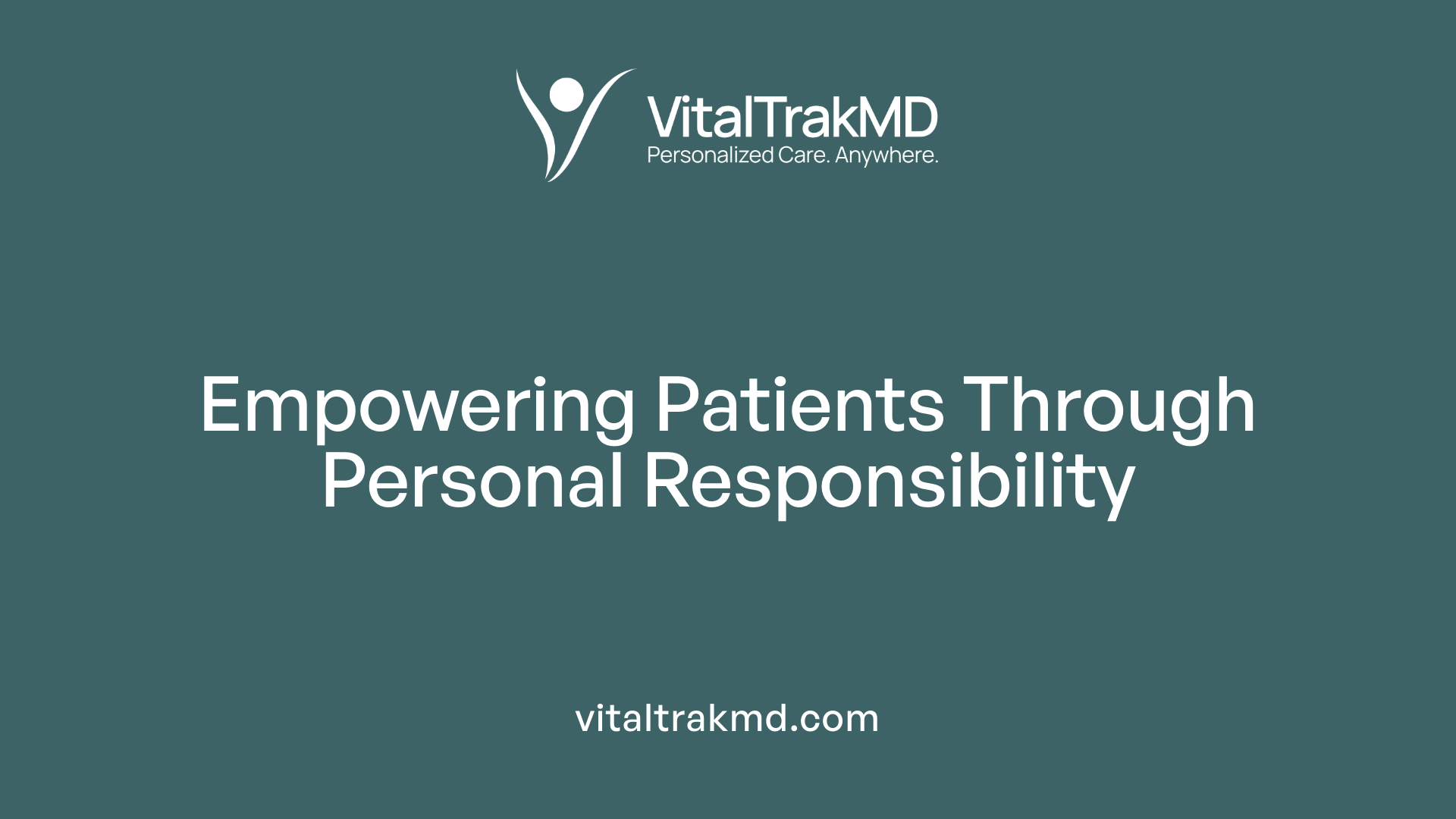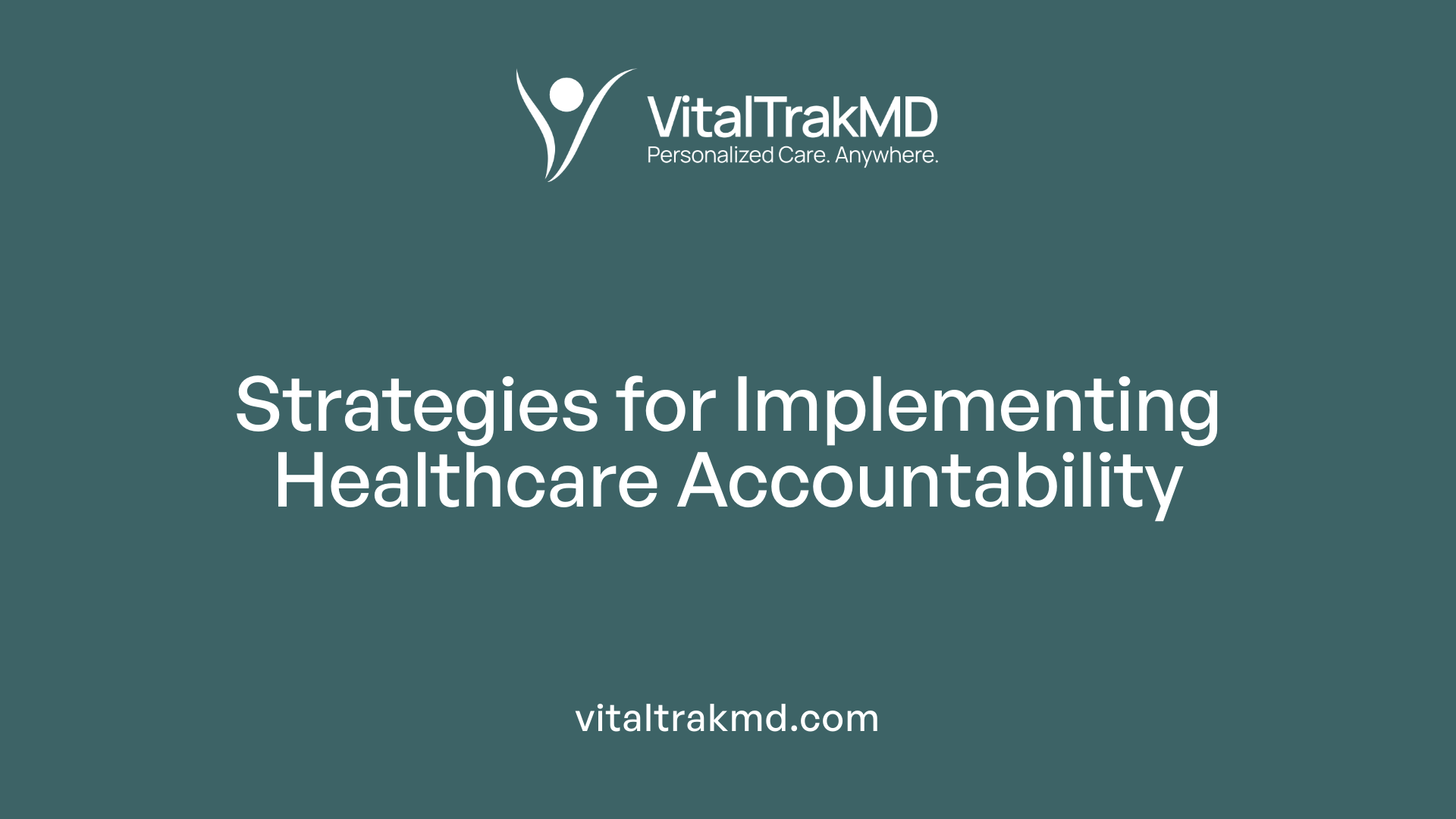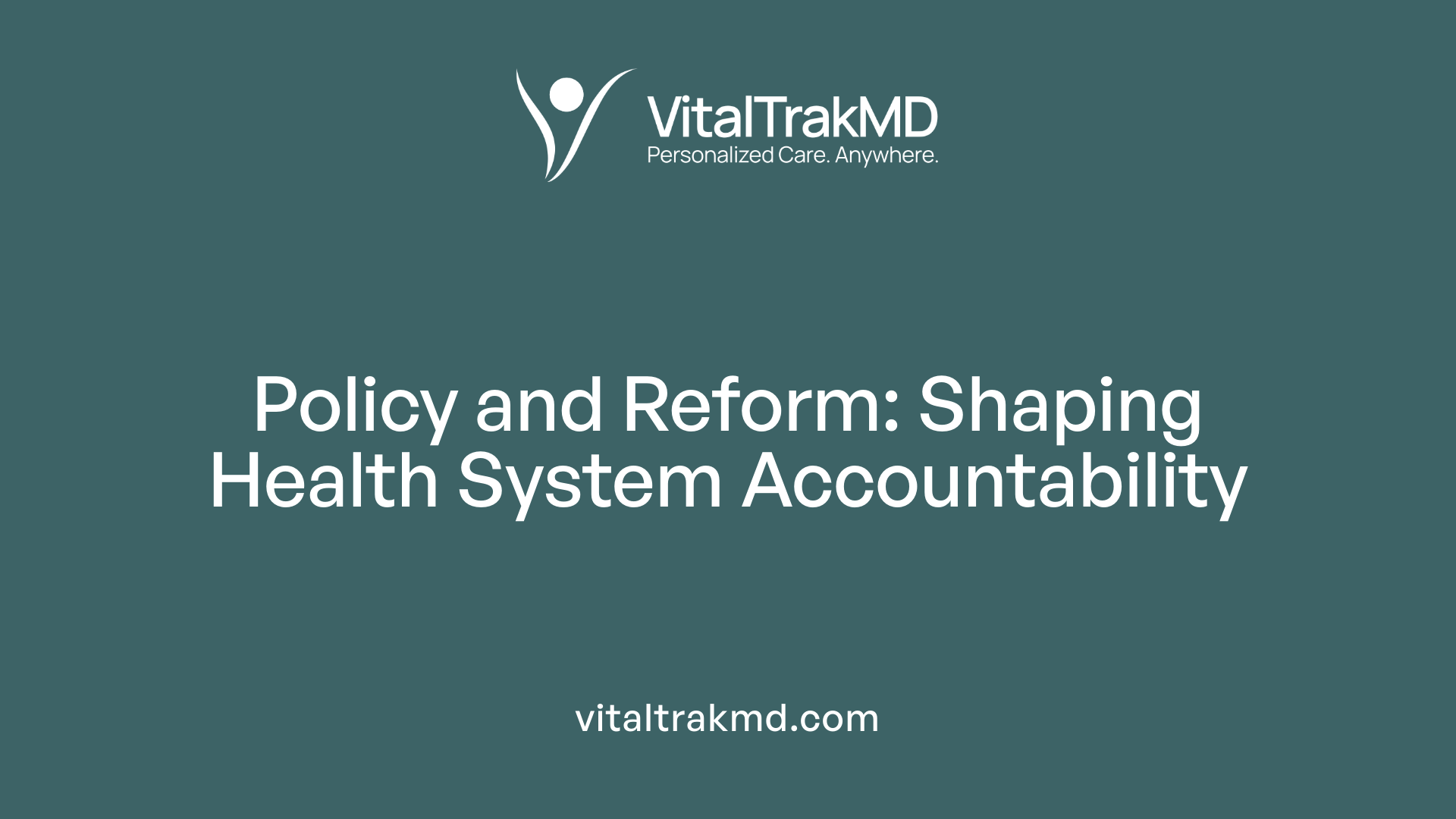The Power of Accountability in Long-Term Health Outcomes

Understanding the Role of Accountability in Achieving Sustainable Health Outcomes
Accountability stands as a cornerstone in the quest for improved long-term health outcomes. Its multifaceted nature influences individual behaviors, healthcare systems, and community infrastructures. This article explores how accountability fosters trust, transparency, and continuous improvement, ultimately leading to healthier populations and more equitable health systems.
Core Components of Accountability in Healthcare

What are the core components of accountability in healthcare?
Accountability in healthcare consists of several vital elements that work together to ensure high-quality and responsible care. These components include responsibility, ownership, transparency, and a commitment to continuous learning and improvement.
Responsibility involves individuals and organizations recognizing and accepting their duties in patient care, organizational roles, and system functioning. This means that healthcare providers and institutions are answerable for their actions, decisions, and the outcomes of care they deliver.
Ownership takes this a step further by insisting that actors actively manage and oversee their responsibilities. It involves taking initiative, making decisions aligned with standards, and being proactive in addressing issues or errors.
Transparency is critical to building trust and fostering an open environment. It requires disclosing processes, decision-making rationales, and outcome data honestly and clearly, which enables all parties to understand, evaluate, and improve practices.
A strong culture of learning and improvement supports accountability by encouraging feedback, self-assessment, and adaptation. Regular review processes, including assessments and performance metrics, help identify areas for growth and ensure that corrective actions are implemented.
Together, these components promote trust among patients, healthcare teams, and organizations. They help create an environment where quality is prioritized, mistakes are openly addressed, and continuous progress is pursued for better health outcomes.
The Significance of Accountability for Long-Term Health Outcomes

Why is accountability crucial for long-term health outcomes?
Accountability plays a vital role in achieving lasting health improvements by establishing a culture centered on transparency and responsibility. When healthcare providers internalize this virtue, it promotes a systematic approach to identifying and correcting errors, which directly enhances patient safety and quality of care.
Practicing accountability encourages clinicians to be self-reflective, taking responsibility for their attitudes, thoughts, and actions. This self-awareness fosters continuous learning and improvement, which are essential for adapting practices and protocols over time.
Furthermore, accountability fosters patient engagement. When individuals know their health providers are committed to transparency and responsible care, they are more likely to follow treatment plans and stay motivated to reach their health goals. Regular monitoring and feedback mechanisms strengthen this commitment, leading to better adherence and long-term health benefits.
At an organizational level, accountability ensures clarity in roles, promotes proactive problem-solving, and supports adaptive responses to healthcare challenges. These elements are necessary for building resilient healthcare systems capable of sustaining improvements.
Ultimately, fostering a culture of accountability builds trust between patients and providers, creating a healthcare environment that not only addresses immediate concerns but also supports continuous progress toward improved health outcomes over time.
Impact of Accountability on Healthcare System Performance and Effectiveness

How does accountability influence health system performance and healthcare effectiveness?
Accountability plays a crucial role in shaping the overall effectiveness and quality of health systems. By clearly defining responsibilities and establishing transparent processes, it ensures that healthcare providers and organizations are answerable for their outcomes. When accountability mechanisms are in place, they foster a culture of continuous improvement, safety, and patient-centered care.
Effective accountability involves setting measurable goals, monitoring progress diligently, and providing timely feedback. This helps identify areas needing improvement and promotes learning within healthcare teams. Accountability also encourages collaboration among different stakeholders, including clinicians, administrators, and patients, which enhances systemic oversight and drives innovation.
Incorporating incentives and fostering open dialogue contributes to a culture where high standards are not only expected but also achieved. For example, transparent reporting of safety protocols and performance metrics builds trust with patients and communities.
Good governance supported by accountability enhances health equity by ensuring that resources and interventions focus on areas with the greatest need. Over time, these efforts result in better health outcomes, increased patient satisfaction, and more efficient use of resources.
Research indicates that health systems with strong accountability frameworks are more adaptable to challenges such as pandemics and chronic disease management. They also tend to demonstrate improvements in safety and quality standards, thus elevating the overall performance of healthcare delivery.
| Aspect | Impact | Examples | Additional Notes |
|---|---|---|---|
| Quality Improvement | Drives ongoing enhancements | Patient safety initiatives, clinical audits | Encourages regular review and upgrading of practices |
| Safety Protocols | Ensures adherence to standards | Infection control, medication safety | Reduces preventable harm |
| Responsibility and Governance | Clarifies roles and accountability | Leadership oversight, reporting structures | Builds trust and clarity in operational responsibilities |
| Innovation and Systemic Oversight | Promotes systemic changes | Digital health, integrated care models | Facilitates strategic improvements and adaptation |
In conclusion, accountability underpins the performance and resilience of healthcare systems. It catalyzes improvements, enhances safety, and fosters systems capable of delivering equitable and high-quality care.
Accountability as a Catalyst for Reducing Health Disparities and Achieving Equity

What role does accountability play in addressing health inequalities and promoting community health equity?
Accountability is fundamental in tackling health inequities and fostering community health equity. It ensures that health systems, policymakers, and organizations are responsible for implementing practices and policies that serve marginalized populations effectively. By establishing transparent reporting and oversight mechanisms, accountability builds trust between communities and health providers.
Structures such as community health initiatives, like Accountable Communities for Health (ACHs), actively involve local residents and community leaders in decision-making. This participatory approach ensures that interventions are tailored to the specific needs of vulnerable groups, making efforts more relevant and effective.
A critical aspect of accountability is resource allocation. When health systems are held responsible for equitable distribution, disparities can be reduced, and systemic barriers like racism, bias, and access differences are directly addressed. Continuous monitoring and feedback enable the identification of gaps, tracking progress, and making necessary adjustments.
Moreover, accountability mechanisms promote a culture of transparency and ongoing improvement. By measuring disparities and openly reporting on outcomes, organizations create pressure and motivation to implement targeted strategies. This process not only elevates standards but also legitimizes community voices, ensuring that policies are culturally sensitive and equitable.
In sum, accountability in health care acts as a driving force that ensures all sectors—public health, clinical providers, and policymakers—work collaboratively towards a shared goal: health equity for all. It sustains efforts to address systemic inequities and fosters the trust and engagement necessary for meaningful, lasting change.
Measuring Accountability: Principles and Challenges

What are the challenges and principles involved in measuring accountability within healthcare systems?
Assessing accountability in healthcare involves developing clear, consistent metrics that can reliably evaluate performance, patient outcomes, and fairness across different communities. These measurements are critical for identifying areas needing improvement and ensuring all parties meet their responsibilities.
Fundamental principles guiding measurement include defining specific roles for healthcare providers and organizations, engaging stakeholders such as patients and community members, and establishing mechanisms for ongoing feedback. This creates a culture of transparency and continuous improvement.
However, several obstacles complicate effective measurement. Fragmented efforts among various agencies and organizations often lead to inconsistent data collection practices. This inconsistency reduces the reliability of performance assessments.
Another challenge is fairly assigning responsibility, especially when multiple actors influence patient outcomes. For example, overlapping responsibilities between healthcare providers, insurers, and policymakers can obscure who is accountable for specific harms or successes.
To overcome these challenges, healthcare systems must adopt disaggregated data to understand disparities across populations and ensure indicators are culturally appropriate. This approach guarantees that measurements reflect the realities of diverse communities.
Enforcement mechanisms are equally important. Without appropriate sanctions or incentives, systems might lack motivation to uphold standards.
Effective accountability measurement also relies on a holistic view, involving systems thinking and interdisciplinary collaboration. Engaging providers, regulators, community representatives, and policymakers helps cultivate a comprehensive approach, ensuring that accountability is meaningful and leads to tangible health improvements.
In sum, establishing robust measures of accountability requires transparency, clarity, stakeholder involvement, and a commitment to continuous refinement. Overcoming data and responsibility challenges is fundamental to achieving equitable and effective healthcare systems.
The Power of Self-Responsibility and Personal Accountability

How does personal responsibility and self-accountability affect individual health outcomes?
Personal responsibility and self-accountability are vital factors in determining health outcomes. When individuals accept ownership of their health, they are more likely to engage in behaviors that promote wellness, such as maintaining a balanced diet, exercising regularly, and following medical advice.
Being accountable to oneself fosters a proactive attitude towards health management. It involves adhering to prescribed treatments, monitoring symptoms, and making informed lifestyle choices. These actions not only improve immediate health but also contribute to long-term well-being.
The effects of personal responsibility extend beyond physical health. They influence emotional resilience, motivation, and self-efficacy. When people perceive that their actions directly impact their health, they often experience a sense of control and purpose, which can lead to neurochemical responses like the release of happiness-inducing hormones. This positive feedback loop encourages ongoing health-promoting behaviors.
However, cultural and social factors shape how responsibility is perceived and enacted. In some cultures, health is viewed as a collective responsibility, involving family or community support. Social relationships can either motivate or hinder individual accountability depending on the level of encouragement and shared values.
On the other hand, externalizing blame—such as attributing health issues solely to genetics or healthcare systems—can decrease motivation for self-management. Dependence on healthcare providers without active personal engagement may impair the development of skills necessary for managing chronic conditions.
Cultivating a culture of accountability within healthcare systems and communities emphasizes transparency, empathy, and support in fostering self-regulation. When individuals feel supported and empowered, they are more likely to embrace responsibility for their health, leading to better adherence, healthier behaviors, and ultimately, improved health outcomes.
The importance of personal accountability in health is well-documented. Research indicates that individuals who consciously take responsibility for their well-being tend to experience higher satisfaction with healthcare and better management of conditions such as obesity, diabetes, and hypertension.
In summary, fostering a sense of personal responsibility and self-accountability is fundamental in achieving desirable health outcomes. It encourages active participation, reinforces positive behaviors, and supports the development of resilient, health-conscious communities.
Effective Methods and Models for Implementing Accountability

What are effective methods for implementing accountability in health pursuits?
Implementing accountability effectively in healthcare relies on a combination of clear communication, measurable performance metrics, robust feedback systems, and a supportive leadership culture.
Firstly, clarity in roles and expectations is essential. Defining specific responsibilities and standards helps ensure everyone involved understands their contribution toward health goals. Aligning these expectations with national policies ensures consistency and coherence across different levels of care.
Regular performance monitoring plays a crucial role. Using collaborative metrics, healthcare providers can track progress objectively, identify shortcomings, and make data-driven decisions. Performance data should be transparent and accessible to foster an environment of trust and continuous improvement.
Feedback mechanisms are vital for maintaining accountability. Structured processes like informal check-ins, formal reviews, and transparent reporting channels enable staff and clinicians to receive constructive feedback and adapt practices accordingly. Incorporating models such as DESC (Describe, Express, Specify, Consequences) can facilitate honest, respectful conversations about performance and behavioral issues.
Leadership commitment influences the success of accountability initiatives. Leaders should exemplify responsibility, professionalism, and humility, setting a tone that values transparency and continuous learning. Encouraging open dialogue and empowering staff to speak up about concerns cultivates a culture where accountability is embedded in everyday practice.
Technology also enhances accountability by providing tools for data collection, analysis, and real-time monitoring. Digital dashboards and health informatics systems help visualize performance trends and support rapid responses to emerging issues.
Stakeholder engagement is another vital aspect. Involving patients, families, and frontline staff in feedback loops ensures that healthcare delivery aligns with community needs and expectations. This inclusive approach fosters shared responsibility and improves trust.
In summary, effective implementation of healthcare accountability combines clear communication, precise measurement, open feedback, committed leadership, and technological support. These elements together reinforce a culture of responsibility that enhances patient outcomes, staff satisfaction, and system resilience.
Community Partnerships and Multisector Collaborations in Promoting Accountability

How do community partnerships and multisector collaborations impact health accountability?
Community partnerships and multisector collaborations play a vital role in strengthening health accountability. These collaborations involve bringing together various organizations—such as healthcare providers, public health agencies, social services, and community residents—to work towards shared health goals.
By uniting diverse sectors, these partnerships promote transparency in decision-making processes, aligning efforts with the specific needs of the community. They foster a culture of shared responsibility where each stakeholder understands their role and contributes to collective health improvements.
Such collaborations often use comprehensive data analysis to identify health disparities and social determinants, ensuring that interventions are equity-focused and community-driven. This fosters trust and active involvement among residents, empowering them to influence policies and initiatives that affect their health.
The systemic nature of multisector efforts enables broader influence on health policy reforms and organizational practices. This influences accountability by setting measurable goals, monitoring progress, and holding organizations responsible for outcomes.
For example, initiatives like Accountable Health Communities and other community-based models demonstrate how joint accountability across sectors can reduce disparities, improve outcomes such as lower opioid overdoses, and manage chronic conditions more effectively.
Furthermore, these partnerships create resilient systems capable of rapid response during crises like the COVID-19 pandemic. They form the backbone of long-term health strategies that extend beyond immediate healthcare, addressing social determinants and fostering sustainable health improvements.
In summary, community partnerships and multisector collaborations are essential mechanisms that enhance accountability through shared responsibilities, community empowerment, and systemic influence. They ensure efforts are transparent, equitable, and effective, leading to better health outcomes and more just health systems.
The Impact of Health System Reforms and Policies on Accountability

What is the significance of accountability in health policies and reforms?
Accountability plays a vital role in shaping effective health policies and reforms. It serves as the backbone for ensuring that health systems deliver quality care, optimize resource use, and meet population health goals. By emphasizing answerability and enforcing sanctions, accountability mechanisms address issues across financial, performance, and political domains.
This framework helps reduce abuse and malpractice, uphold standards, and create a culture of continuous learning and improvement. Monitoring activities and holding providers, insurers, and government agencies responsible fosters enhanced safety, quality, and equity within healthcare services.
Public trust is strengthened when health authorities and organizations are transparent about their actions and outcomes. Such transparency encourages innovation and motivates all stakeholders to participate actively in reform processes. Overall, embedding sound accountability practices leads to health systems that are more equitable, efficient, and capable of responding to the changing needs of the populations they serve.
Conclusion: Building a Culture of Long-Term Accountability in Healthcare

Leadership commitment
Establishing a culture of accountability begins with strong leadership that prioritizes transparency, responsibility, and continuous improvement. Leaders in healthcare organizations must set clear expectations, model responsible behavior, and support staff in embracing accountability as a core value. This involves not only aligning organizational goals with accountability principles but also fostering an environment where feedback is welcomed and acted upon.
Sustainable practices
Implementing sustainable accountability practices ensures that efforts are maintained over time. This includes establishing long-term policies that encourage responsible resource management, transparent performance measurement, and consistent evaluation of health outcomes. Embedding accountability into daily routines and organizational culture helps sustain high-quality care and adapt to evolving healthcare challenges.
Community engagement
Active involvement of the community is essential for building trust and relevance in healthcare systems. Engaging residents and community partners in decision-making processes helps ensure that services meet actual needs and promote health equity. Community-driven accountability initiatives empower residents, foster collaboration, and promote shared responsibility for health outcomes.
Continuous evaluation
Ongoing assessment of accountability efforts enables healthcare systems to identify gaps and improve practices. Using data-driven insights, organizations can monitor progress towards health goals, assess the effectiveness of interventions, and make necessary adjustments. A commitment to continuous evaluation nurtures a learning environment where accountability is reinforced and integrated into organizational DNA.
Implementing these elements collectively fosters a culture of long-lasting accountability, ultimately leading to better patient outcomes, higher practitioner satisfaction, and healthier communities.
Fostering a Lasting Culture of Accountability for Better Health
Creating a resilient, transparent, and equitable health system requires embedding accountability at every level. From individual providers to policy frameworks, fostering a culture of responsibility through leadership, community involvement, and continuous evaluation ensures that health systems are responsive to long-term needs. Emphasizing collective responsibility and shared success can transform health outcomes and advance health equity for all.
References
- Accountability as a virtue in medicine: from theory to practice - PMC
- The Role of Accountability in Achieving Health Goals
- The Effect of Outcome vs. Process Accountability-Focus on ...
- Accountable Care: Focusing Accountability on the Outcomes that ...
- Accountability of Members/Patients to Maintain a Healthy Lifestyle
- Accountable Communities for Health: What We Are Learning from ...
- Accountability in Health Theory - OSF
- Accountability frameworks: A critical evolution in healthcare
Recent articles
Want to Feel Better and Live Healthier?
Join hundreds of patients taking control of their health with personalized care that fits their life – not the other way around.
Rated 4.8/5 by 32+ customers







